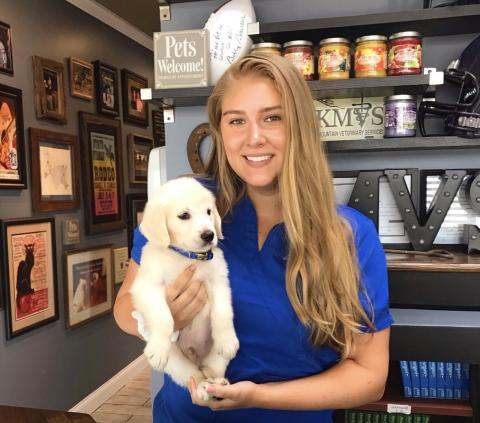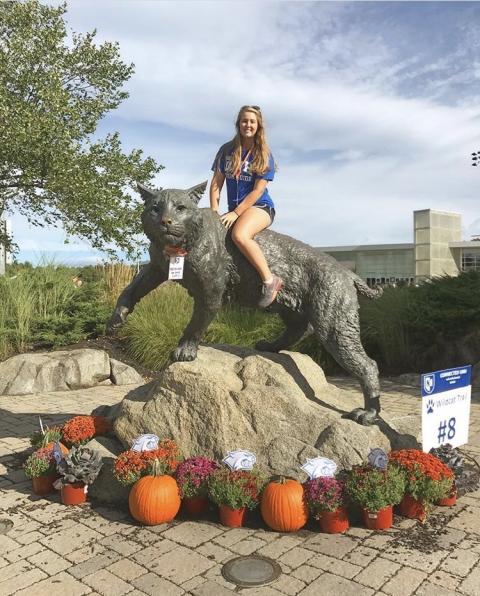
Hannah Ziegele ’20 has won first place in the Peter T. Paul Entrepreneurship Center’s 2020 Maurice Prize for Innovation competition for her idea, AnimalTemp. The award was announced during the final presentations held via Zoom on April 21. The biomedical science: medical and veterinary science major with a dairy management minor is the first COLSA student to win the prize.
AnimalTemp provides constant, reliable, and non-invasive temperature readings for animals of all sizes by using an inexpensive RFID tag attached to a collar and a customized app.
“Between November 2019 and March 2020, Hannah not only grew AnimalTemp from a nascent idea to the product she presented before the judges, but acquired numerous skills during her journey, ranging from idea development and exploring the entrepreneurial process, to learning the RFID and antenna technology required to bring her idea to fruition,” said Ian Grant, executive director of the Entrepreneurship Center.
The J. Dolores and Alfred P. Maurice Prize for Innovation was founded by Fred Maurice to encourage students to be daring and embrace both success and failure as equally valuable outcomes of the innovative learning experience. The Maurice Prize, first awarded in 2018, is now in its third year of supporting those first leaps of student innovation and curiosity.
Hannah Ziegele: I came up with the idea for AnimalTemp after years of shadowing at veterinary clinics and working on farms. Each summer I worked at a veterinarian’s office, and my job duties included taking the temperature of every animal in the building. Taking a rectal temperature from a dog or cat is difficult and time-consuming. We often missed animals who had high temperatures because it was so long between measurements.
This problem bothered me, and it made me think about how we could do this more efficiently. My brother works in technology, so we started talking about ways to automate taking and recording animal temperatures.
Hannah: Temperature is a simple indicator for health, but taking temperature with traditional methods is invasive and time-consuming. By automating temperature monitoring and tracking, AnimalTemp enables veterinarians (and pet owners) to have real-time 24/7 temperature monitoring.
The AnimalTemp app also provides alerts when temperature readings are too low or too high. The app can be used in veterinary clinics and farms and is capable of tracking over 750 animals per system. Pet owners can also use a mini system to track temperature and health of family pets. It provides the ability to monitor animal health from anywhere at any time.
Hannah: A friend in the business school told us about the ECenter, and we followed the guidelines as we developed the AnimalTemp idea. There were multiple times throughout the development process that the ECenter reached out to help me — they are a great resource for students.
"Innovation is probably most often stopped by repetitive failures. There were several times when I wanted to give up on the AnimalTemp idea because nothing worked, and everything we tried seemed to fail. Believing in the benefits and looking past the failures, I had just enough motivation to not give up."
Hannah: I learned that innovation is probably most often stopped by repetitive failures. There were several times when I wanted to give up on the AnimalTemp idea because nothing worked, and everything we tried seemed to fail. Believing in the benefits and looking past the failures, I had just enough motivation not to give up. Innovation is a fragile combination of failure and motivation.
Hannah: Take action and stick with it through failures — that is the key to success. Collaborate with others, because diversity of perspectives and input can turn failure into success. Reach out for help, push ahead and do not be afraid to fail!
Hannah: I will invest this prize money back into the products. Improvements still need to be made in the collars, and there are also several clinical applications such as detecting the breeding heat signals in cows. There is also a huge amount of work to do when we are ready to bring AnimalTemp to the market.
Hannah: A big reason why I selected UNH was the biomedical science pre-vet program. UNH offers hands-on experience for undergraduates who are aspiring to attend vet school. CREAM (Co-operative Real Education in Agricultural Management) is a unique program offered at UNH not available at other schools. The program provides an opportunity for students to manage a herd of dairy cows and is on campus at the UNH Fairchild Dairy Teaching and Research Center.
Hannah: My major is biomedical science: medical and veterinary science and my minor is dairy management. What excites me most about working in this field is the opportunity for discovery and advancement through science and technology. I have spent the last four years studying organic chemistry, genetics, physiology of lactation, the pathogenic basis of diseases, and other subjects that support my goal of becoming a veterinarian. My major studies were all interesting and important, as I prepare to attend veterinary school next year.

Hannah: I am most proud of the time I spent at UNH working with and learning about dairy cows. Before moving to New Hampshire from Georgia, I had never touched a cow. In my first year (and first-class) at UNH, I was given a dairy heifer to care for and train for the Little Royal Livestock Show. As a junior, I was accepted to CREAM, where I learned how to manage a herd of 25 dairy cows. I found this both rewarding and interesting, and along the way also earned a minor in dairy management.
Hannah: After graduation, I will be attending Atlantic Veterinary College at the University of Prince Edward Island. I was accepted to their 4-year veterinary program and will be continuing my journey to become a veterinarian!
Hannah: The faculty at UNH are both professional and caring. My professors took a genuine interest in me and helped guide me through the difficult biomedical sciences curriculum. I also had a great deal of hands-on experience with animals through the CREAM program and other classes, which gave me both confidence and helped me relate many of the subjects I was studying to the real world.
Hannah: What I love most about UNH is the sense of community. From my first visit, I knew that UNH was the school for me. It has the perfect combination: a challenging learning environment and a supportive, professional faculty.
Learn More